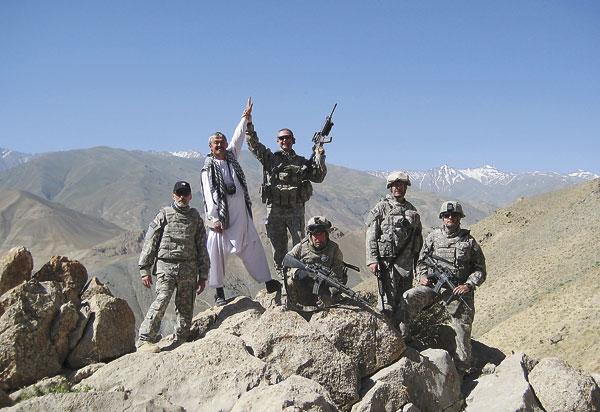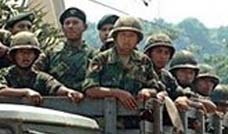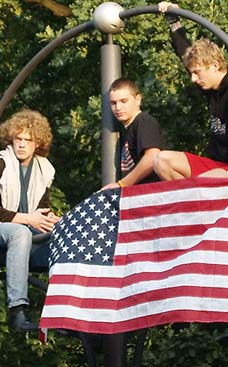
Evans' team focuses on agricultural reconstruction, which involves instructing agriculture students at Al-Beruneey University in how to prune trees or teach farmers how to store pomegranates so that they can sell a larger ripe batch at one time and get a higher market price. "These people need any assistance they can get. They just don't know some of the techniques," he said. "And the ability to purchase equipment is beyond their means." Other projects include a recycling business to process the 9 metric tons (9.9 short tons) of plastics Bagram Air Base uses each day, and helping farmers find alternatives to growing poppies, the source of Afghanistan's heroin traffic. "We have only scratched the surface," said Thomas Billak, USDA provincial reconstruction team coordinator for Kabul. "After 30 years of war, the five years that we have been here is just the beginning." Evans is also trying to raise money for a composting machine which will turn waste from the Bagram Air Base into fertilizer for farmers. "It is fairly complicated, because we're dealing with a lot of people," Evans said. "There is a lot of interest, but it is a large base, and trying to get to the right section to talk to people takes time." That process alone took two months, he said. Once a system is established to organize and process the waste, the compost will generate a business and make farming cheaper for individuals. "We're trying to target an individual to start a business selling compost to the farmers," Evans said. "The main problem right now is lack of fertilizer. Right now, they buy fertilizer from Pakistan, but it is getting adulterated. It is poor-quality fertilizer. We want to help and make fertilizer locally."
Stationed in the Bagram Air Base in the Parwan province of Afghanistan, Paraguay RPCV Kelan Evans has been working since April 2008 as an agricultural adviser for a provincial reconstruction team through the U.S. Department of Agriculture
MU graduate works to boost business in Afghanistan
Tuesday, September 16, 2008 | 7:09 p.m. CDT
BY CASSIDY SHEARRER
Caption: Kelan Evans, far left, agricultural adviser for the Kapisa-Parwan Provincial Reconstruction Team in Afghanistan, hiked a mountain in the Sirkh Parsa District in the Kapisa Province looking for a water source to supply a hospital below.
COLUMBIA — Kelan Evans hasn't had a day off in five months.
Stationed in the Bagram Air Base in the Parwan province of Afghanistan, Evans has been working since April 2008 as an agricultural adviser for a provincial reconstruction team through the U.S. Department of Agriculture. His job is to develop sustainable agricultural businesses that will be run by Afghans.
After decades of war, widows are in the greatest need, Evans says. So he helped create a saffron-growing project for a group of 30 widows in the Kapisa province. Saffron is an expensive spice that can serve as the basis for a good business, Evans says. Finding land was a challenge, but after four months of planning, the saffron is about to be planted.
"We lined up training for them (the women) and developed the marketing aspect," Evans said. "They don't really have other work alternatives."
Before Evans introduced his project, the widows — like most Afghans — were subsistence farmers.
Evans is a 1987 graduate of MU with a bachelor's degree in forestry economics. He is in Afghanistan helping to rebuild a country that, starting with a series of coups that began in 1973, has endured multiple civil wars, a decade of war with the Soviet Union and Taliban rule.
In early 2002, following U.S. military operations against the Taliban, the U.S. government began placing provincial reconstruction teams in Afghanistan, said Henry Ensher, director of the Afghanistan Office for the U.S. Department of State.
According to Ensher, an Air Force or Navy officer commands each provincial reconstruction team, which consists of military members and one to three civilian experts such as Evans — usually from the U.S. State Department, U.S. Agency for International Development or U.S. Department of Agriculture. There are currently 24 provincial reconstruction teams operating in Afghanistan. Thirteen are from the United States and the rest are from 11 other countries.
Evans' team focuses on agricultural reconstruction, which involves instructing agriculture students at Al-Beruneey University in how to prune trees or teach farmers how to store pomegranates so that they can sell a larger ripe batch at one time and get a higher market price.
"These people need any assistance they can get. They just don't know some of the techniques," he said. "And the ability to purchase equipment is beyond their means."
Other projects include a recycling business to process the 9 metric tons (9.9 short tons) of plastics Bagram Air Base uses each day, and helping farmers find alternatives to growing poppies, the source of Afghanistan's heroin traffic.
"We have only scratched the surface," said Thomas Billak, USDA provincial reconstruction team coordinator for Kabul. "After 30 years of war, the five years that we have been here is just the beginning."
Evans is also trying to raise money for a composting machine which will turn waste from the Bagram Air Base into fertilizer for farmers.
"It is fairly complicated, because we're dealing with a lot of people," Evans said. "There is a lot of interest, but it is a large base, and trying to get to the right section to talk to people takes time." That process alone took two months, he said.
Once a system is established to organize and process the waste, the compost will generate a business and make farming cheaper for individuals.
"We're trying to target an individual to start a business selling compost to the farmers," Evans said. "The main problem right now is lack of fertilizer. Right now, they buy fertilizer from Pakistan, but it is getting adulterated. It is poor-quality fertilizer. We want to help and make fertilizer locally."
Evans developed a passion for aid work while in the Peace Corps in Paraguay. He saved part of his earnings from the Peace Corps to help a Paraguayan community get electricity and, on a visit back home, filled up a duffel bag with gifts for the kids. His mother, Pat Evans, says he's always been compassionate and self-sufficient.
"In the Peace Corps, he would wash his clothes in the river. It was unbelievable. I think that's why he can live with little," Pat Evans said. "What he does, he goes at with everything."
She said with a laugh: "He went from a homebody to an Indiana Jones after the Peace Corps."
Pat Evans says her son is doing the kind of work he enjoys. He's not happy being tied down to an office.
"I actually feel like I'm making a difference," Evans said. "It was another opportunity to do something like the Peace Corps (and) a hiatus from the embassy."
But there have been times he has caused his mother some worry. While he was in Paraguay, there was a coup, and Pat Evans had to call Washington to check on him. Now, he calls her once a week from Afghanistan.
"He's been in some pretty dangerous situations," Pat Evans said. "But when he does go out, he has a convoy, not like in the Peace Corps. It's a worry. But we're as proud as all get-out of what he can accomplish."
Her son is embedded with military troops and arranges his projects around the group's movement. During his time in Afghanistan, Evans has been fired upon. How safe he feels depends on the province he's in.
"When my time's up, my time's up," Evans said. "I don't think about it, I just go out and do my job and have a good time doing it."












